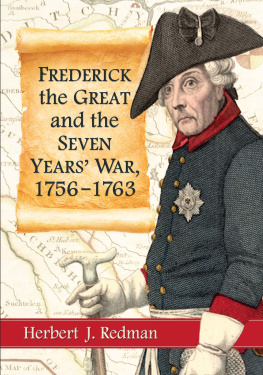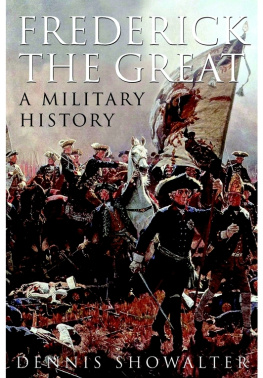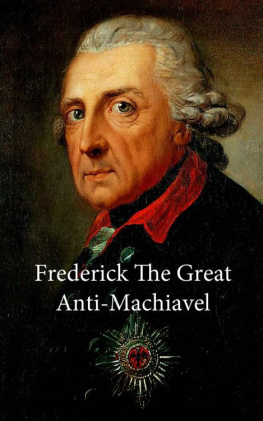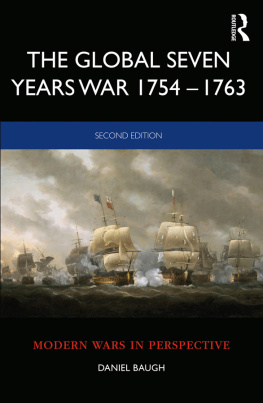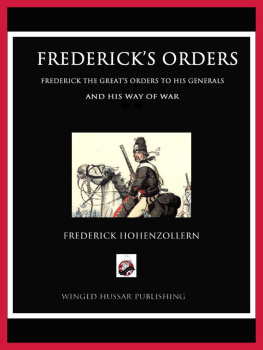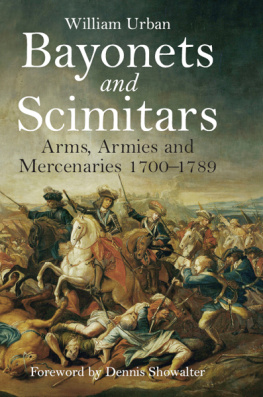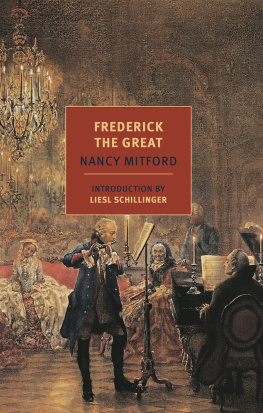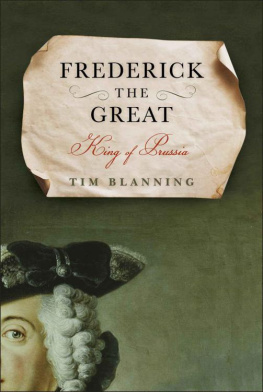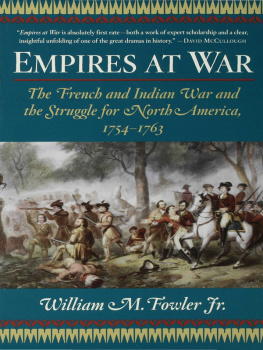
Frederick the Great and the Seven Years War, 17561763
HERBERT J. REDMAN

McFarland & Company, Inc., Publishers
Jefferson, North Carolina
The author would like to express his appreciation to Nanette Argabrite, Isaac Hodges, and Delbert Gibson for their assistance with the preparation of the maps for this work.
LIBRARY OF CONGRESS CATALOGUING DATA ARE AVAILABLE
BRITISH LIBRARY CATALOGUING DATA ARE AVAILABLE
e-ISBN: 978-1-4766-1300-0
2015 Herbert J. Redman. All rights reserved
No part of this book may be reproduced or transmitted in any form or by any means, electronic or mechanical, including photocopying or recording, or by any information storage and retrieval system, without permission in writing from the publisher.
On the cover: artwork Friedrich the Great, Emperor of Germany, King of Prussia, 1910 2014 PicturesNow; banner 2013 Shutterstock; background map: Battle of Krefeldmap printed in The Gentlemans Magazine, 1758
McFarland & Company, Inc., Publishers
Box 611, Jefferson, North Carolina 28640
www.mcfarlandpub.com
Preface
The research and writing of this book has occupied many yearsmuch longer than the duration of the war. In a time just removed from the world wars of the twentieth century, wars in which Germany played a significant rle, we take pause and reflect. That nation demonstrated, even as she fell short in both of her major wars, a tenacity and a military prowess which has had few equals in the history of the world. The question can be legitimately asked, From whence did this rich tradition of military prowess originate? In a similar query, What rle did Prussia, the old northern German kingdom, play in Germanys military rise and tradition? This long, proud tradition that has extended for centuries cannot be denied. Part and parcel of that tradition, and its noted founder and earliest chief benefactor, was King Friedrich II, better known to history as Frederick the Great (17121786).
It can be argued, with some justification, that Fredericks father, Friedrich Wilhelm, forged the weapon that had been instrumental in his sons military accomplishments, the Prussian army, but the fact remains that the son alone utilized the tool that had been so carefully crafted by the father.
The subject of this work, the Seven Years War (17561763), remains the greatest achievement of that aforementioned son. It is a tale shrouded in some mystery, even though interest in military history has been revived of late. The Seven Years War is not well known in North America, which has been concerned mostly with its own part in that warotherwise known as the French and Indian War. This is in spite of the fact that the struggle in Central Europe from 1756 to 1763 had a profound effect on the rest of the fighting. This work is an attempt to shed some light on this subject, in a readily accessible form.
In the interest of clarity, some terminology should be explained. Throughout the book, the Prussian army is also referred to as bluecoats; the Russian army as greencoats; the Austrians as whitecoats; and the British as redcoats. These terms, of course, refer to the uniform colors worn by the respective armies.
I first learned of the Prussian King Frederick and of the Seven Years War as a small boy, on a trip to the local arcade with my father. I picked up an oversize book, Great Military Battles by Cyril Falls et al., read about the Battle of Rossbach and was intrigued by this eighteenth century monarch. Napoleon and Hitler were also represented in Falls book and, though they were interesting, I determined right then and there to find out more about this Frederick the Great and the Seven Years War.
A war waged for seven long years, often against overwhelming odds, and at the end of it all stood Frederick, who had neither won nor lost but merely weathered the storm. Against long odds, Prussias military reputation had not only survived the conflagration, but, by 1763, had been enhanced.
It is this tale that is told in these pages. To the authors knowledge it is the first detailed account of the war in Germany from 1756 to 1763 in more than a century. As such, the view of the wars events can only benefit from more recent scholarship that was not available to earlier authors. It is my sincerest hope that the following work will be well received by both the scholars of the period as well as the reading public.
Introduction: Prelude to War
In 1756, the first war in the history of the world that could be called a world war sprang forth. The king of Prussia, Frederick the Second (II) or Frederick the Great, imagined he was about to pay for a sin he had committed 16 years earlier. In 1740, he had marched into the province of Silesia, which was part of the Austrian Empire (it also happened to be the countrys richest province just then). Frederick had seized the opportunity afforded by the death of Emperor Charles VI of Austria on October 20, 1740, and the assumption of the throne of Austria by a young, inexperienced woman of 24, Maria Theresa.
The First and Second Silesian Wars directly resulted from this aggressive act, but this was not the sole reason the powers of France, Austria, Russia, Sweden, and most of the German Reich were preparing to crush Prussian military power in the mid1750s. There were actually a number of motives, and not all can be laid at Fredericks door. But the king of Prussia had established a well-deserved reputation for making alliances with foreign powers and then breaking those agreements when it no longer benefitted his country.
If that factor were not bad enough, the monarch possessed the honest, but annoying, habit of speaking his mind with little thought of diplomacy. He practiced this freedom of expression just about whenever and wherever he chose. There were inevitable consequences. For instance, Fredericks formerly friendly relationship with the Russian Court soured based entirely upon some biting witticisms about Czarina Elizabeth I made by the irascible Prussian monarch. Not satisfied, the Prussian king then turned his attention to the court at Versailles. Soon, the coarse jokes that issued forth from the mouth of Frederick piqued the other two major female representatives of Europe, Madame de Pompadour, King Louis XVs minister in France, and that Queen of Austria, Maria Theresa.
Looking at these events centuries removed from them, it is apparent Frederick had to reap the whirlwind from a policy he had practiced during the period from the early 1740s, in trying to isolate his country from the predicaments of his foreign neighbors. By the mid1750s, this policy of insulating Prussia was leaving her without allies in what was to be the coming fury. France was distant to a renewed alliance, but the Prussians calculated that the age old enmity between France and Austria would sooner or later lead France back into the Prussian fold.
Unfortunately for Frederick, he miscalculated on changing times in the mid-eighteenth century. Great Britain had replaced Austria as Frances chief rival by the 1750s. This was due in part to political issues in Europe, but also because the English were encroaching increasingly upon the vulnerable French colonies in both North America and Asia. Even worse for Frederick, the French also recognized this.
Just when Frederick realized that Maria Theresa and her ministers were formulating a new plan to recover Silesia and humble Prussia at the same time, is not known. He probably suspected since the end of the Second Silesian War in 1745. The Prussian king was notorious for not communicating his intentions. And there were additional problems.
Next page
